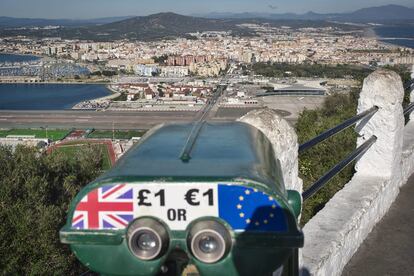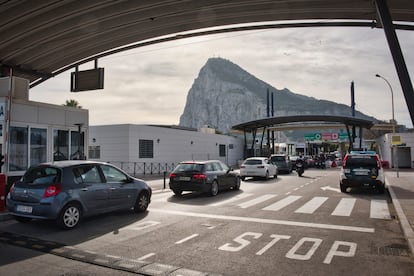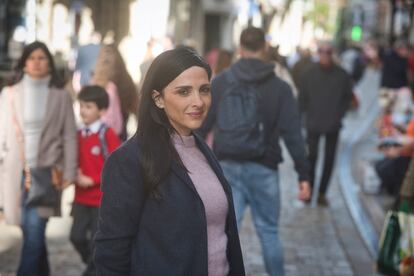Gibraltar in Brexit limbo as EU border negotiation enters third year
Residents of the Rock fear a hard frontier with Spain, which would place livelihoods at stake. Talks between London and Madrid on a treaty have yet to bear fruit


Alberto Valdivia’s work WhatsApp group was ablaze on the evening of 14 December. The working day had ended hours previously, but he and his colleagues were still online, closely following a press conference in Madrid held by Spanish Minister of Foreign Affairs José Manuel Albares and his UK counterpart, Secretary of State for Foreign Affairs James Cleverly. Their livelihoods depended on it: of the nine employees of the Gibraltar-based shipping company Incargo, five are Spanish nationals who cross the border every day. “We follow every Brexit development and this time it seemed that, at last, they were going to say something about the treaty on Gibraltar’s relations with the EU,” says Valdivia, a 33-year-old accountant from Algeciras. But soon disappointment soon set in. “After a while, we were all commenting that they weren’t saying anything new. We were left waiting, and we are still waiting.”
Spain and the United Kingdom have been negotiating the agreement that will govern the EU’s relations with Gibraltar following Brexit ever since a pre-agreement was reached on December 31, 2020. The talks have no clear timeframe but adding to the uncertainty are Spanish and Gibraltarian elections in 2023.
The Spain-Gibraltar border is crossed every day by 15,000 workers, 11,000 of whom are Spanish, according to figures from the Cross Frontier Group, an organization made up of businesses and trade unions. For months, the daily migration has been carried out peacefully and with fluidity. But Valdivia knows what it is like to find himself in lines of vehicles waiting half an hour or 45 minutes to cross over, at the whim of any conflict, be it as worldly as a strike or as ethereal as a diplomatic misunderstanding. He also knows that if no agreement is reached and Gibraltar becomes a hard border with the EU, his livelihood will hang by a thread. “We’re trying to be optimistic, but it’s worrying. We don’t even know what they are negotiating now. Everything is up in the air, even my job. And that’s despite the fact that Gibraltarians and Spaniards are mutually dependent on each other,” he says.
Speaking after the meeting in Madrid, Cleverly said “significant progress” had been made but alluded to points that still needed to be ironed out over the text and implementation of the treaty. Since then, silence has reigned. “There are constant conversations,” a source close to the UK side of the table said. Gibraltar’s First Minister Fabian Picardo said during his New Year speech that what is being debated is primarily agreements on immigration and the movement of goods. The former issue was addressed in the New Year’s Eve agreement-in-principle, whereby “maximized and unrestricted mobility of persons between Gibraltar and the Schengen area” will be conditioned by the presence of Spanish and Gibraltarian police at entry points and overseen by Frontex, the European Union’s border and coast guard agency, for a period of four years.

How and where that presence will materialize without clouding the opposing stances of Spain and the United Kingdom on sovereignty have been the focus of negotiations since then. While the UK narrowly voted in favor of Brexit, 95.91% of Gibraltarians supported remaining in the EU. Now, residents of the Rock have gone through all the psychological phases of a duel: from initial shock to acceptance and learning. The New Year’s Eve 2020 agreement provided a measure of relief. But two years later, with no definitive treaty in sight, Gibraltar remains at an impasse. “It’s a pain, but we’re used to it,” says Salomon Massias, who together with his brother Daniel owns four franchised Eroski supermarkets in Gibraltar.
Although Gibraltar has managed to avoid the consequences of a hard Brexit, departure from the EU has been felt in details such as the impossibility of importing food products by land from the UK, as there is no Border Inspection Point (BIP) in La Línea on the Spanish side to check goods after their transit through EU territory. The only solution is for these checks to be carried out at the BIP in the nearby Spanish port city of Algeciras and then transported to Gibraltar by sea. “Now we are bringing in fewer of these products, but culturally we need our tea and our English biscuits. We can only receive goods every two weeks. You put in an order and it takes 20 days to arrive, so the shelf life has to be longer. Plus, prices have gone up,” says Massias.

Gibraltarians, however, view such issues as a lesser evil that the prospect of a hard border with Spain. As such there are those who choose to resort to pure pragmatism, such as Marlene Hassan-Nahon, a member of the Gibraltar Parliament and leader of the progressive party Together Gibraltar: “Having a new infrastructure to be part of a Europe that will bring us prosperity will not destroy our identity,” she says. Picardo spoke in a similar vein in his televised speech: “An agreement might initially be uncomfortable in some areas. Just like signing up to membership of the EU might initially have felt uncomfortable in 1972. But ‘no deal’ will also be very uncomfortable.”
Sign up for our weekly newsletter to get more English-language news coverage from EL PAÍS USA Edition
Tu suscripción se está usando en otro dispositivo
¿Quieres añadir otro usuario a tu suscripción?
Si continúas leyendo en este dispositivo, no se podrá leer en el otro.
FlechaTu suscripción se está usando en otro dispositivo y solo puedes acceder a EL PAÍS desde un dispositivo a la vez.
Si quieres compartir tu cuenta, cambia tu suscripción a la modalidad Premium, así podrás añadir otro usuario. Cada uno accederá con su propia cuenta de email, lo que os permitirá personalizar vuestra experiencia en EL PAÍS.
¿Tienes una suscripción de empresa? Accede aquí para contratar más cuentas.
En el caso de no saber quién está usando tu cuenta, te recomendamos cambiar tu contraseña aquí.
Si decides continuar compartiendo tu cuenta, este mensaje se mostrará en tu dispositivo y en el de la otra persona que está usando tu cuenta de forma indefinida, afectando a tu experiencia de lectura. Puedes consultar aquí los términos y condiciones de la suscripción digital.








































